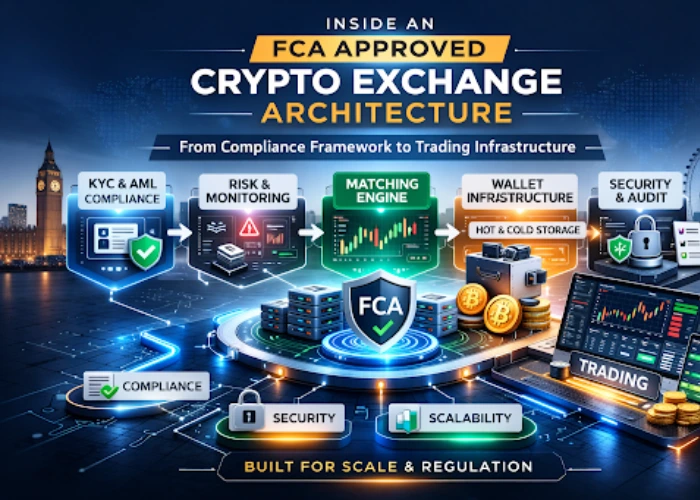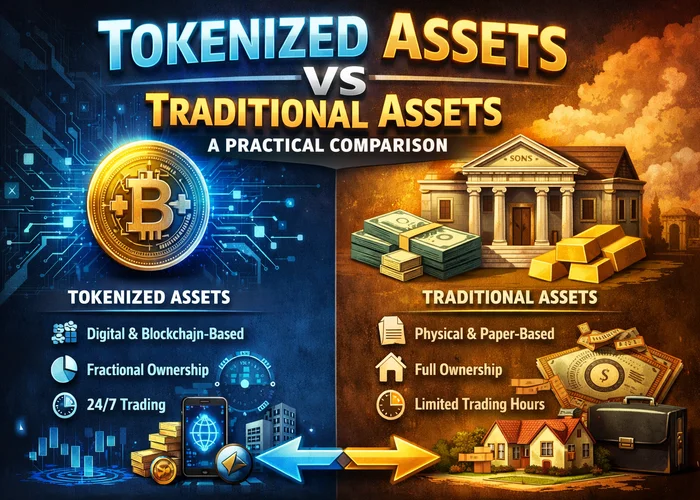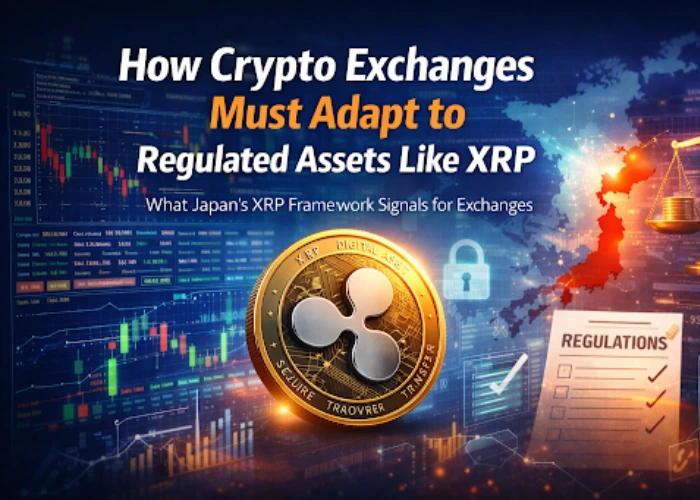Blockchain technology is going to keep growing over the next few years, even though it has already gotten a lot of attention. Statista says that the blockchain business will be worth a cumulative 1 trillion U.S. dollars by the year 2032. Businesses need to take advantage of this growing trend, but it can be hard to decide between custom and white label options. It is important to know the main difference between custom vs white-label blockchain solutions so that you can make a smart choice that fits your business’s needs and budget.
This blog post talks about the main differences between custom vs white label blockchain solutions, as well as important things you should think about before picking the right one for your business.
Custom vs White-label Blockchain Solutions: The Difference
Businesses frequently have to decide between custom vs white label blockchain solutions when deploying blockchain technology. Knowing the distinctions between these two strategies will enable you to base your choice on the particular requirements and objectives of your business.

What Are Blockchain Solutions?
Blockchain solutions are tailored systems that leverage blockchain technology to solve complex business problems by ensuring transparency, security, and efficiency. These solutions are applied in diverse industries such as finance, supply chain, healthcare, and more. A major area where blockchain solutions shine is in cryptocurrency exchange development, with businesses opting for Custom vs White Label Blockchain Solutions based on their unique needs.
Custom Blockchain Solutions are built from scratch, tailored to meet specific business requirements. They offer full control and flexibility but require significant time, technical expertise, and resources. On the other hand, White Label Blockchain Solutions provide ready-made platforms that can be customized to a certain extent. For instance, businesses can quickly Create a cryptocurrency exchange or Start a White-Label Cryptocurrency Exchange with these solutions, minimizing development time and cost.
To stay competitive, it’s crucial to understand the Top 8 Centralized Crypto Exchange Development Trends, such as integrating advanced security features and offering seamless user experiences. The Importance of Security in Cryptocurrency Exchanges cannot be overstated, as it builds trust and protects user assets.
Companies looking to Create Instant cryptocurrency exchanges or explore How to Create a Decentralized Cryptocurrency Exchange often turn to Best White Label Crypto Wallet Development services. These solutions streamline wallet integration for secure transactions.
A reliable Centralized Crypto Exchange Development Company can help businesses Set up a white label cryptocurrency exchange, Develop a white label cryptocurrency exchange, or even Launch a white label cryptocurrency exchange effectively. As the demand for robust blockchain solutions rises, the Top 10 Crypto Exchange Development Companies in 2025 will play a pivotal role in shaping the future of this dynamic industry.
Choosing between Custom vs White Label Blockchain Solutions depends on your business goals, budget, and timeline. With the right partner, you can achieve efficient, secure, and scalable blockchain success.
Understanding Custom Blockchain Solutions
- Tailored Development: To satisfy a business’s particular needs, custom blockchain solutions are created from the ground up. This method gives you total freedom to create features, functionalities, and integrations that are tailored to your company’s requirements.
- Higher Costs: Because custom blockchain solutions require specialized development teams, intensive research and development, and longer deployment timelines, they are often more expensive to construct.
- Complete Control: You have complete authority over the technology stack, functionality, and design when you use a custom solution. If your company needs extremely specialized features or special blockchain settings, this could be beneficial.
- More Flexibility: As your company’s demands change, custom solutions give you the freedom to adapt and modify. For businesses that need highly specialized features or expect regular changes, this flexibility can be essential.
- Time-consuming: Because it requires extensive planning, development, and testing stages, creating a custom blockchain from the ground up can take a lot of time.
What Are White Label Blockchain Solutions?
- Pre-Built Framework: Pre-built platforms that can be rebranded and tailored to meet the requirements of various enterprises are known as white-label blockchain solutions. These solutions provide a pre-made foundation that can be easily modified to meet your needs and branding.
- Lower Costs: Because the underlying technology has already been created and validated by the supplier, white-label solutions are typically less expensive than unique solutions. This can cut down on development time and initial investment considerably.
- Faster Deployment: White-label solutions may be implemented more rapidly because the underlying technology is already built, which enables companies to join the market sooner.
- Limited customisation: White-label solutions might not be as adaptable as custom-built solutions, even though they do allow some degree of customisation. Companies might have to operate within the limitations of the current structure.
- Less Control: You have less authority over the features and underlying technology when using a white-label solution. If your company needs extremely specific features or particular blockchain setups, this could be a drawback.
Definition and Main Characteristics
Blockchain solutions are innovative systems designed to leverage blockchain technology to address various business challenges, streamline operations, and enhance transparency. These solutions encompass both custom vs white label blockchain Solutions, catering to the diverse needs of enterprises.
Custom Blockchain Solutions are tailored systems built from the ground up to meet specific requirements. They provide complete flexibility and control, allowing businesses to design and develop blockchain solutions that align perfectly with their goals. These solutions are ideal for organizations seeking unique features or specialized functionalities, but they require significant time, resources, and technical expertise to implement.
On the other hand, White Label Blockchain Solutions are pre-designed platforms that can be easily customized to suit a business’s branding and functional needs. These solutions are cost-effective, quicker to deploy, and ideal for companies looking to enter the market swiftly. They simplify processes like launching crypto exchanges or wallets without the need for extensive development.
Main Characteristics of Blockchain Solutions
- Decentralization: Data is distributed across multiple nodes, ensuring no single point of failure.
- Transparency: Transactions are recorded on an immutable ledger, accessible to authorized users.
- Security: Advanced cryptographic techniques protect data, making it resistant to fraud and hacking.
- Scalability: Customization allows the system to scale according to business needs.
- Efficiency: Automating processes reduces manual errors and operational delays.
Whether opting for Custom vs White Label Blockchain Solutions, businesses must evaluate their goals, resources, and timelines. White label options offer speed and affordability, while custom solutions deliver unmatched personalization. By understanding these characteristics, companies can choose the solution that best aligns with their blockchain objectives.
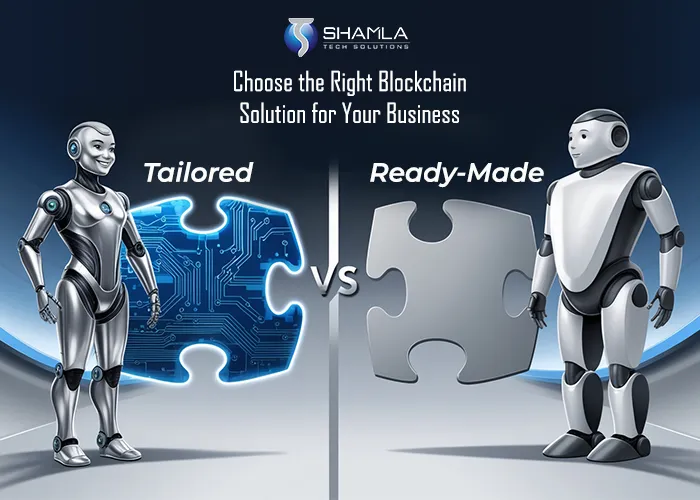
Pros and Cons of Custom Blockchain Solutions
Aspect | Pros | Cons |
Personalization | Fully tailored to meet specific business needs and objectives. | Development requires extensive time and resources. |
Flexibility | Offers complete control over features, design, and functionality. | Requires skilled developers and blockchain expertise. |
Scalability | It can be designed to handle future business growth and additional use cases. | High costs are associated with building and maintaining the solution. |
Security | Allows implementation of advanced security measures specific to the business model. | Testing and ensuring security can be time-consuming and complex. |
Competitive Advantage | Provides a unique solution that can differentiate the business from competitors. | Longer time-to-market compared to white label solutions. |
Integration | Seamlessly integrates with existing systems and processes. | High risk of failure if not properly planned and executed. |
Ownership | Full ownership of the solution, including the source code and intellectual property. | Responsibility for ongoing updates, troubleshooting, and scaling lies entirely with the business. |
Cost | Potential for long-term cost savings by avoiding third-party licensing fees. | High initial investment compared to white label blockchain solutions. |
Pros and Cons of White Label Blockchain Solutions
Pros | Cons |
Cost-Effective: White label solutions are more affordable than custom development, saving on initial costs. | Limited Customization: Pre-built solutions may not fully cater to unique business needs, limiting flexibility. |
Faster Deployment: These solutions are ready to use and can be deployed in a significantly shorter timeframe. | Dependence on Provider: Relying on a third-party provider can create dependency for updates and maintenance. |
Technical Expertise Not Required: Businesses without in-depth blockchain knowledge can still implement blockchain solutions seamlessly. | Potential Compatibility Issues: White label solutions may face challenges integrating with existing systems or technologies. |
Proven Technology: Established white label solutions are tested and come with pre-built features that ensure reliability. | Brand Differentiation: Limited ability to differentiate from competitors using the same white label solution. |
Scalable Options: Many white label providers offer scalability options, making it easy to handle growing demands. | Hidden Costs: Additional charges for support, customizations, or scaling can increase long-term expenses. |
Reduced Risk: Leveraging pre-existing, trusted solutions minimizes the risk of bugs and failures. | Security Concerns: Dependence on external providers may expose businesses to data security vulnerabilities. |
Ongoing Support: Providers often include technical support and regular updates, ensuring seamless operations. | Limited Control: Businesses may not have full control over the code, updates, or customization. |
Choosing the Right Solution: Key Considerations
The choice between custom vs white label blockchain solutions ultimately boils down to the particular requirements, financial constraints, and schedule of your company. Let’s dissect it even more:
Select a Unique Blockchain Solution If:
- You require a solution that is entirely customized to your operational procedures, business strategy, and expansion goals.
- You want to differentiate yourself from the competition and have a special use case that generic platforms cannot fulfill.
- You’re willing to devote a substantial amount of time and money to development, as well as continuing maintenance and updates.
- You want total control over the performance, scalability, and security elements of your blockchain.
Select a Blockchain White Label Solution If:
- You don’t have time for drawn-out development processes and need to implement your blockchain solution soon.
- You need a cost-effective option to get started because you have a limited budget.
- You are happy with a pre-built platform that you can modify to suit your brand, and your company doesn’t need a lot of customisation.
- You want a solution that minimizes your requirement for in-house technical skills by providing continuous support and maintenance.
Real-Life Examples of Both Solutions
Ethereum Blockchain Development
Ethereum, a pioneer in blockchain technology, is a prime example of a custom blockchain solution. Designed with flexibility in mind, it allows developers to create smart contracts and decentralized applications (dApps) tailored to various industries. Its ability to adapt and scale demonstrates the importance of Custom vs White Label Blockchain Solutions for businesses needing specific functionalities.
Binance Exchange
Binance, a leading cryptocurrency exchange, showcases how creating a custom platform can result in a robust and feature-rich system. With bespoke features such as advanced trading tools, enhanced security, and proprietary tokenomics, Binance highlights the potential of creating a cryptocurrency exchange through custom development. Security remains paramount, emphasizing The Importance of Security in Cryptocurrency Exchanges.
JP Morgan’s Quorum
JP Morgan developed Quorum as a custom blockchain solution for financial institutions. Quorum offers enhanced privacy and transaction speed, catering specifically to enterprise needs. Its custom design aligns with Top 8 Centralized Crypto Exchange Development Trends by prioritizing scalability and efficiency.
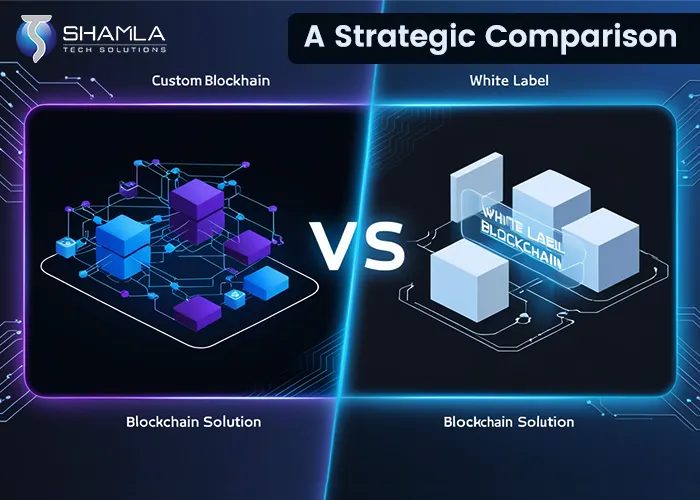
White Label Blockchain Solutions: Ready-to-Deploy Efficiency
Paxful White Label Exchange
Paxful provides a white label platform that enables businesses to create a white label cryptocurrency exchange easily. By using pre-built templates and backend support, Paxful reduces the development time, showcasing the benefits of Best White Label Crypto Wallet Development for businesses wanting a fast entry into the market.
Coinify Merchant Payment Solution
Coinify offers businesses a ready-made solution for cryptocurrency payments, allowing them to set up a white label cryptocurrency exchange or integrate crypto payments into their system. This white label solution highlights the ease of developing a white label cryptocurrency exchange without needing extensive blockchain expertise.
Coinbase Custody
Coinbase Custody offers a white label blockchain solution for asset management. Its features include institutional-grade security and easy integration with existing systems, catering to businesses that prioritize launching a white label cryptocurrency exchange securely.
Comparison: Custom vs White Label Blockchain Solutions
While custom blockchain solutions like Ethereum and Binance provide unparalleled flexibility and innovation, white label options like Paxful and Coinify focus on speed and affordability. Businesses looking to create instant cryptocurrency exchange platforms often lean towards white label options, while enterprises with complex needs favor custom solutions.
Whether you aim to start a white-label cryptocurrency exchange or invest in custom blockchain development, understanding your business goals is crucial. With companies vying for spots in the Top 10 Crypto Exchange Development Companies in 2025, it’s essential to select the right approach for long-term success.

Future Trends in Blockchain Development
1. Interoperability
Numerous blockchains have recently been developed for a variety of uses, including smart contracts, data storage, and payments. These blockchains function independently as distinct systems with their own set of regulations. As a result, establishing links between them is challenging.
One of the main developments in blockchain technology is ensuring connectivity between new and current blockchains. Software developers are able to develop intricate apps with distinctive characteristics thanks to this collaboration, which helps to build a linked ecosystem with the advantages of each distinct blockchain.
To achieve interoperability in the blockchain ecosystem, for instance, the Interchain Foundation developed Cosmos Network (source). Through the creation of certificates, Cosmos’ Interblockchain Communication Protocol (IBC) enables chains to speak with one another. Interoperability won’t be possible if one of the chains in a possible link is unable to generate a certificate.
However, there are other ways to communicate across blockchains besides IBC. Additionally, there is Polkadot’s Parachain technology, Cardano’s bridge concept, Lisk’s Cross-Chain Messages, and so on. One novel application of the blockchain environment is data interchange between chains.
2. Blockchain-based IOT infrastructure
The Internet of Things, or IoT, is in its prime and is expanding and changing all the time. With cloud solutions, software, and hardware compatibility, IoT creates a unique environment. Its conventional system is centralized and insufficiently safe, despite the fact that it generates and transmits substantial amounts of data.
For this reason, developing decentralized architecture and cryptographic encryption tools is one of the blockchain technology developments combining with the Internet of Things. These blockchain-based Internet of Things technologies expand the range of applications and create new opportunities.
Blockchain-enabled IoT devices can assist in the management of smart cities by providing transparent and automated processes. It continuously monitors a wide range of variables and guarantees real-time communication between organizations, citizens, and governments. This technique has already been used in a few cities with remarkable outcomes. One of the top smart cities in 2022, Copenhagen now hopes to become the first carbon-neutral city by 2025 (source).
3. Asset Tokenization
The process of establishing digital tokens that represent certain real assets is known as asset tokenization. They may have many properties and values, such as commodities, artwork, real estate, etc. However, they may all be digitized and split up into little tokens and units. These tokens are exchangeable on several blockchain systems and signify ownership.
Among the most widely used blockchain platforms is Ethereum. The ERC-20 protocol, which enables users to claim a portion or complete ownership of tokens created on the Ethereum network, often secures these tokens.
The ability to purchase a portion of an asset without purchasing the full one is a huge benefit of digital assets. For this reason, one of the newest developments in blockchain technology among investors is asset tokenization. For instance, it operates in the real estate sector and is anticipated to transform it in the future. Therefore, the lack of costly real estate investment procedures might make the real estate business accessible to a wider variety of investors.
4. The growth of NFTs
The idea of asset tokenization is quite similar to that of non-fungible tokens (NFTs). NFTs have unique characteristics, although both are digital representations of value. Since NFT is unique, no other token of equivalent value may take its place. Additionally, it has the ability to link the digital and physical worlds. NFT can solely be digital, or it can be a digital copy of the physical object or proof of ownership.
NFTs are typically utilized for artwork because of their distinctiveness. They were first applied to digital visual arts such as pictures, GIFs, and videos. Nonetheless, recent developments in blockchain indicate the growth of their application space. Numerous NFTs have been developed in a variety of industries, including luxury products, gambling, fashion, music, ticket sales, and more.
Decentralized games, for instance, make advantage of the X-to-Earn notion. Users of these games can Move to Earn, Learn to Earn, and so on by earning incentives for various actions. NFTs are used as in-game objects or awards, and players can learn more about blockchain technology in this type of gaming format.
5. The Metaverse
The Metaverse resembles a virtual environment where users can work, unwind, interact with others, and engage in other digital activities. The idea of the Metaverse is still in its infancy, but it is expected to differ greatly from all of the virtual experiences we have ever enjoyed.
Although its final form is still unknown, it shares several traits with the gaming industry, augmented reality (AR), and virtual reality (VR). We currently know a few fundamental characteristics of the metaverse, and new blockchain technology makes the majority of them possible.
6. Blockchain-as-a-Service (BaaS)
The cloud-based architecture known as Blockchain-as-a-Service (BaaS) makes it possible to implement and utilize blockchain applications. BaaS creates blockchain technology trends through its useful use. Businesses can more easily implement blockchain thanks to this technology.
Any business may create and implement a blockchain application without having to worry about complex infrastructure management. This lowers resource usage and fosters innovation by increasing the application’s availability and adaptability. Additionally, BaaS enables companies to choose the blockchain protocol that best suits their needs.
In 2024, BaaS is anticipated to be one of the major blockchain trends. Blockchain services are currently available from tech behemoths like Amazon and Microsoft. They handle infrastructure and upkeep and function similarly to web hosting companies.
Conclusion
Choosing between Custom vs White Label Blockchain Solutions depends on your business’s unique needs, resources, and goals. Custom solutions offer unparalleled flexibility and innovation, allowing businesses to build platforms tailored to their specific requirements. On the other hand, white label blockchain solutions prioritize speed, affordability, and convenience, enabling rapid deployment with minimal technical expertise.
If you’re an enterprise aiming to create a cryptocurrency exchange, a custom solution provides the scope to integrate advanced features, proprietary designs, and robust security measures. Meanwhile, startups or small businesses can benefit from white label platforms, helping them set up a white label cryptocurrency exchange and enter the market quickly without compromising on essential functionalities.
The decision between custom vs white label blockchain solutions lies in balancing your budget, timeline, and vision. With emerging Top 8 Centralized Crypto Exchange Development Trends, businesses must consider scalability, security, and user experience to thrive in this competitive landscape. Understanding the Importance of Security in Cryptocurrency Exchanges further solidifies why selecting the right solution matters.
Whether you aim to develop a white label cryptocurrency exchange or invest in a custom blockchain platform, making an informed choice will shape your success in this rapidly evolving industry.

Why Shamla Tech is Best in Both Custom vs White Label Blockchain Development?
Shamla Tech is a trusted leader in blockchain development, excelling in both Custom vs White Label Blockchain Solutions to cater to businesses of all sizes.
Custom Blockchain Expertise
Shamla Tech has a proven track record of creating tailored blockchain solutions that align with specific business objectives. From enterprises seeking to create instant cryptocurrency exchanges to those innovating with decentralized platforms, Shamla Tech’s custom solutions guarantee scalability, enhanced performance, and cutting-edge features.
White Label Blockchain Prowess
Recognized for its efficiency in white label services, Shamla Tech simplifies the process for businesses looking to start a white-label cryptocurrency exchange. Their pre-built platforms ensure quick deployment while maintaining the highest standards of security and functionality. Their solutions are fully customizable, enabling clients to launch a white label cryptocurrency exchange with ease.
Comprehensive Blockchain Solutions
Whether it’s offering Best White Label Crypto Wallet Development or crafting advanced decentralized platforms, Shamla Tech combines innovation with user-centric design. Their expertise in the Top 10 Crypto Exchange Development Companies in 2025 positions them as the ideal partner for businesses aiming for long-term success.
Security-Centric Approach
Shamla Tech understands the Importance of Security in Cryptocurrency Exchanges and incorporates robust encryption and compliance protocols in all their solutions. This ensures that businesses operate in a secure environment while fostering user trust.
By blending custom innovations with efficient white label services, Shamla Tech empowers businesses to thrive in the blockchain landscape, making it the go-to Centralized Crypto Exchange Development Company for all blockchain needs. Whether you’re exploring how to create a decentralized cryptocurrency exchange or need guidance on which solution suits your venture best, Shamla Tech stands as a reliable partner for success.


